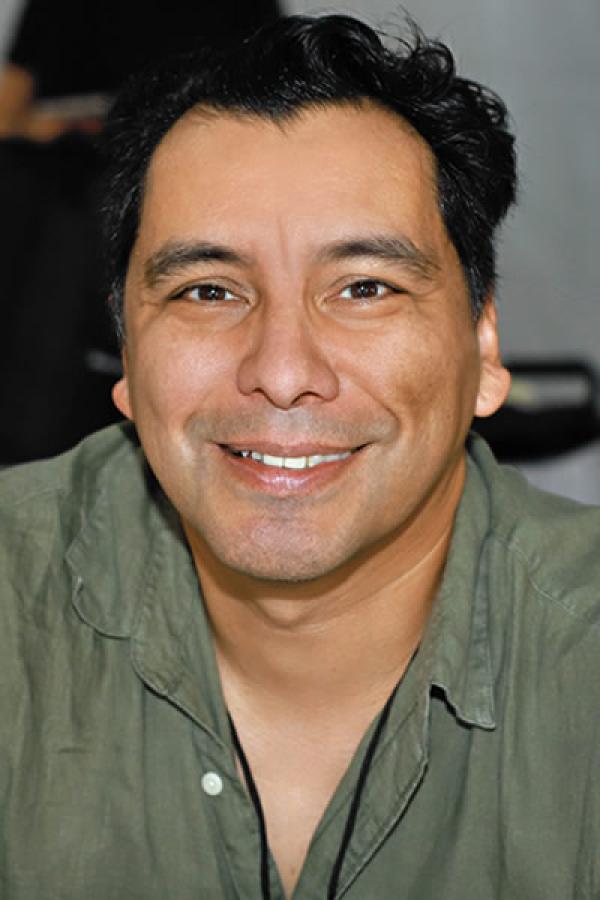Manuel Munoz

Photo by Larry D. Moore, CC BY 4.0, Wikimedia Commons.
Bio
Manuel Muñoz is the author of a short-story collection, Zigzagger, published by Northwestern University Press in 2003. He is the recipient of a Constance Saltonstall Foundation Individual Artist's Grant in Fiction and his work has appeared in many journals, including Swink, Epoch, Glimmer Train, and Boston Review, and has aired on National Public Radio's Selected Shorts. Algonquin Books of Chapel Hill will publish his second collection of stories in early 2007. A native of Dinuba, California, Manuel graduated from Harvard University and received his MFA in Creative Writing from Cornell University. He now lives in New York City, where he is at work on a novel.
Photo © by Karl Cluck
Author's Statement
What is most gratifying about being awarded a literature fellowship is knowing that part of the NEA's declared mission is to further "American creativity." It's that adjective - American - that means a great deal to me as a writer. I think all writers who bear the burden of being identified by ethnicity or race have a deep longing to break open what it means to be considered an American writer. We know firsthand how complex and tense it is to confront our collective history, how difficult it has been (and still is) to tell our particular stories and have them accepted into the national literature. On a personal level, I know the fellowship is an individual award, a validation against the heavy doubt that awaits me every time I approach my desk. But I'm accepting it as a challenge and a responsibility: I am a Chicano writer who has benefited tremendously from the sacrifices of many who came before me, writers who were never recognized with prizes or even properly published. I owe them my best work and my best effort in helping a still young literature establish itself firmly as an essential part of American letters.
From the short story "The Faith Healer of Olive Avenue"
In those last days, the paper mill had had so much trouble keeping Shift Three fully staffed that management turned the other way to the men disappearing into the vineyard to sneak whiskey, a joint, whatever kept them going in those odd hours when the world disappeared completely into sleep. Out in the vineyard, Emilio could smell pot wafting down the rows, heard leaves parting and boots in the dust. Shift Three was nothing but former high-school troublemakers or family of management, all men, mostly single, and generally suspicious of each other. Ask Patricio, the one they fired just three weeks ago after someone ditched his own joints into Patricio's work shirt, hanging in the break room, during the surprise inspection. This was why Emilio, even after having had more than a few sips of whiskey already, had hurried with the joint, trying to savor it a little but not wanting to be late back to his post, smothered the remnants down into the thick dust of the vineyard. This was why, once back at his post, he hesitated asking someone to help him wrap the pallet he had to forklift over to the opposite wall for shipping at nine sharp. Stubborn, Emilio tugged a few sheets around alone, a difficult job because the plastic almost adhered to itself, exactly the way it did when his father fumbled with the leftovers plate. Three sheets around, he did a quick glance around to see if anyone noticed, and then scrambled onto the forklift, hoping to get the pallet over where it was supposed to be and let the morning crew worry about it. When he raised the pallet, though, the forklift let out a metallic groan and jerked to a halt just when the load was about six feet off the ground. Jiggling the controls did no good and, his senses heightened into a mild paranoia about being caught with whiskey on his breath, Emilio gunned the forklift one more time, but to no avail. He jumped down from his seat and leaned a look into the front end of the forklift, seeing almost immediately what the problem was - one of the chains had jacked out like a broken bone. Putting his hand forward to touch it, Emilio flinched it back immediately, recognizing the danger, but just as he let go of his stubbornness and was about to yell down the warehouse aisle for help, the wood of the pallet creaked with a sound that made him think of an old bridge back in Texas and the sensation of looking down into a cold, racing creek filled him, too. But Emilio was looking up at the ill-wrapped boxes of paper collapsing, the wooden pallet splintering and suddenly shifting the entire weight of the load. The forklift itself could not handle the distribution either and it came crashing down over on its side, Emilio futilely raising his hands to the massive amount of weight. All of those men who had been in the vineyard had come running and he had heard them screaming, but Emilio couldn't let any sound out of his own mouth. He had felt the blood drain away around his legs with every painful thump of his heart. The cement floor of the warehouse had gone slick with blood - dark red, almost brown, against the gray, and Emilio had turned his head to see work boots leaving faint footprints of it as the men struggled to lift off boxes, one at a time.
Copyright © 2006 by Manuel Muñoz.

